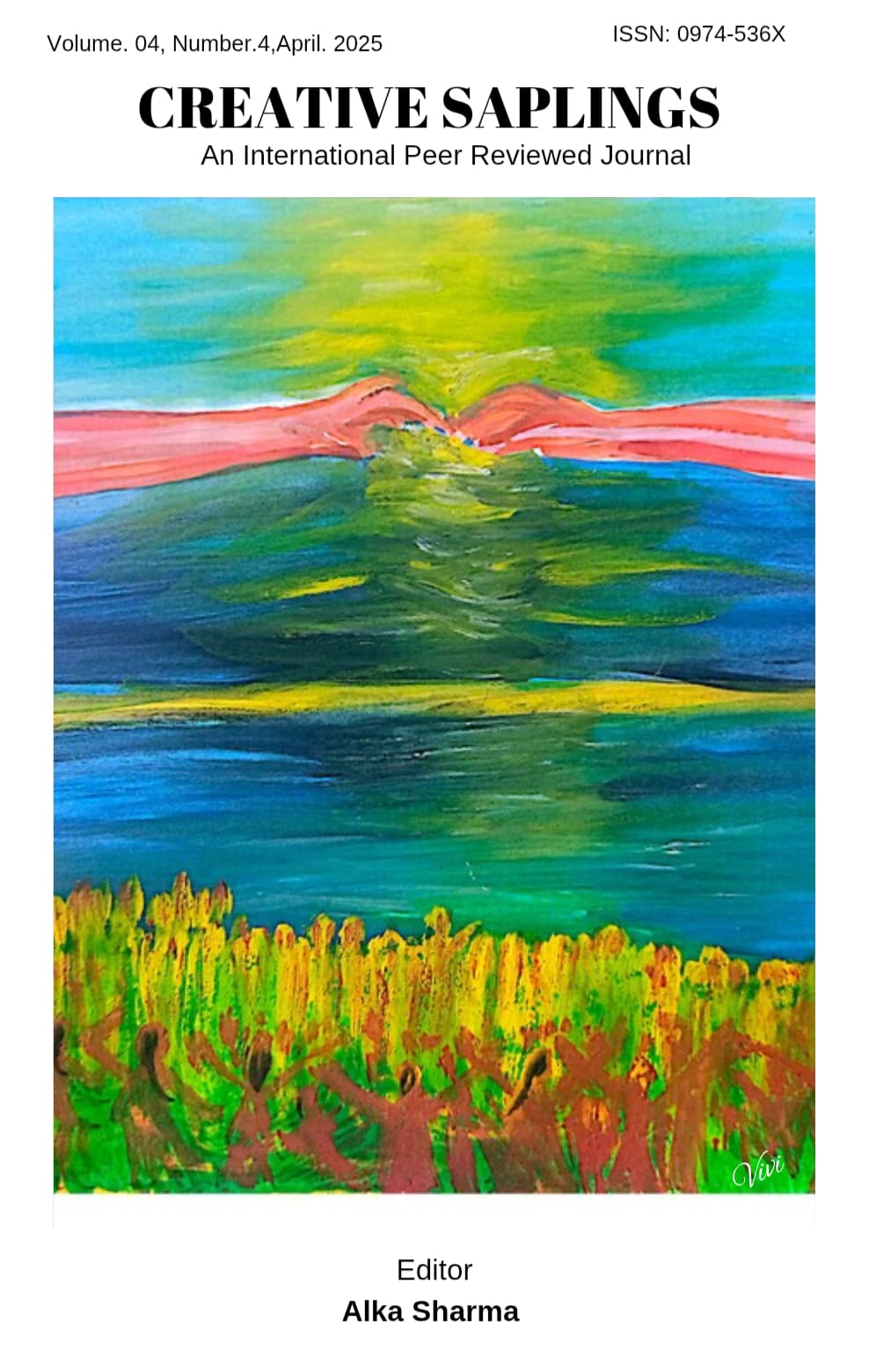Designing ESP Tasks with Web series for Medical English in TBLT Classrooms
DOI:
https://doi.org/10.56062/gtrs.2025.4.04.924Keywords:
Web Series (WS), English for Specific Purposes, Medical English, Task-Based Language Teaching (TBLT), Pedagogical.Abstract
The study aims to focus on the pedagogical deployment of medical-themed web series through Task-Based Language Teaching (TBLT) framework, to aid the formation of medical English competence. Grounded in different theoretical frameworks and learning perspectives, this article proposes a systematic yet practical approach to designing TBLT tasks with complementary authentic audio-visual input to enhance linguistic competences for specific medical purposes in professional contexts. The proposed framework emphasizes the importance of developing higher-order language skills including listening, speaking, reading, and writing and critical thinking and professional expressions. The research suggests how web series can serve as a pedagogical method for enabling language acquisition and learning in the context of medical education, in an immersive and contextualized manner. The paper provides sample tasks aligned with key medical communication skills, including patient interactions, diagnostic discussions, and emergency protocols. The increasing demand for specialized language skills in the realm of medicine and its subsequent advantages have led to a need for incorporating web series in ESP curricula, which will enhance engagement, encouraging interactive and effective learning experience.
Downloads
References
Ahmed, Mohammed K. Task-Based Syllabus Design: Specific Needs in Curriculum. no. 1, Mar. 1990, pp. 25–36, https://ci.nii.ac.jp/naid/110007616491.
Amatulhafeez Alvi et al. “From Pedagogy to Andragogy in Post Covid-19 ESP Courses: A Customized Blended Learning Model for English in Medicine at a Saudi University.” World Journal of English Language (2023). https://doi.org/10.5430/wjel.v13n2p77
Amelia, Pratiwi. Redesigning English For Specific Purpose (Esp) Curriculum To Pre-Service Facilitators of Primary Education Department At STKIP Muhammadiyah Bangka Belitung. no. 1, Jan. 2019, pp. 260–65.
Basturkmen, Helen. “English for Medical Doctors.” Developing Courses in English for Specific Purposes, 2010, pp. 88-107.
Birtić Vučić, M., & Štulina, A. (2024). The task as the central unit of planning and instruction in the EAP syllabus design. Scripta Manent., 19(2), 56–68. https://doi.org/10.4312/sm.19.2.56-68.
Brinton, Donna M., Marguerite Ann Snow, and Marjorie Bingham Wesche. Content-Based Second Language Instruction. University of Michigan Press, 2003.
Chapelle, Carol, and Carol A. Chapelle. Computer Applications in Second Language Acquisition. Cambridge UP, 2001.
Cunningham, U. (2014). The Role of Media in Second Language Acquisition. TESOL Quarterly, 48(4), 806-831.
Dudley-Evans, Tony, and Maggie J. John. Developments in English for Specific Purposes. Cambridge UP, 1998.
Ellis, Rod. Task-based Language Learning and Teaching. Oxford UP, 2003.
Feak, C. B. (2008). Ideas and options in English for specific purposes. Studies in Second Language Acquisition, 30(01), 104–105. https://doi.org/10.1017/S0272263108080108.
Galimberti, Valeria. “Book: Using Tasks in Second Language Teaching. Practice in Diverse Contexts.” Didacticae, no. 16, Oct. 2024, pp. 1–5, https://doi.org/10.1344/did.42050.
Gatehouse, Kristen. “Key issues in English for specific purposes (ESP) curriculum development.” The internet TESL journal 7.10 (2001): 1-10.
Gavioli, Laura. “Exploring Corpora for ESP Learning.” Studies in Corpus Linguistics, 2005.
Hasan, Ali A. “The Effect of Using Task-Based Learning in Teaching English on the Oral Performance of the Secondary School Learners.” International Interdisciplinary Journal of Education, vol. 3, no. 2, 2014, pp. 250-264.
Honmode, S. “Understanding the Indian web series an analysis of Sacred Games.” Journal of Emerging Technologies and Innovative Research 6.6 (2019): 258-266.
Hutchinson, Tom, and Alan Waters. English for Specific Purposes. Cambridge UP, 1987.
Hyland, Ken. English for Academic Purposes: An Advanced Resource Book. Taylor & Francis US, 2006.
Kavaliauskienė, Galina. Task-Based Learning and Learning Outcomes in the ESP Classroom. no. 7, Jan. 2005, pp. 66–70, https://www.ceeol.com/search/article-detail?id=94183.
Kumaravadivelu, B. Understanding Language Teaching: From Method to Postmethod. Routledge, 2006.
Long, Michael H. Second Language Needs Analysis. Cambridge UP, 2005.
M. O. Khan et al. “Necessity of ESP (English for Specific Purpose) Courses for Medical and Science Learners at Najran University, Saudi Arabia: An Exploratory-cum-remedial Study.” Theory and Practice in Language Studies, 10 (2020): 208-217. https://doi.org/10.17507/tpls.1002.09
Meshram, Sourabh, and Mohammad A. Pasha. “Study of Pragmatic Development and Knowledge Domain Through Web Series Among Youth.” ShodhKosh: Journal of Visual and Performing Arts, vol. 4, no. 2, 2023.
Nunan, David. Task-Based Language Teaching. Cambridge UP, 2004.
Oksana Melnychuk et al. “DESIGNING ESP COURSES FOR MEDICAL LEARNERS: ADDRESSING LINGUISTIC CHALLENGES AND PROFESSIONAL RELEVANCE.” Вісник науки та освіти (2025). https://doi.org/10.52058/2786-6165-2024-12(30)-429-441.
Rinantanti, Yulini, et al. “Oral Proficiency in Higher Education: A Comprehensive Examination of Task-Based Language Teaching (TBLT) for ESP Learners.” Al-Ishlah, vol. 16, no. 2, June 2024, https://doi.org/10.35445/alishlah.v16i2.4813.
Sakti, Nur Sri, et al. “Redefining Esp: Bridging the Gap between Traditional Methods and Modern Educational Needs.” Klasikal: Journal of Education, Language Teaching and Science, vol. 6, no. 3, Dec. 2024, pp. 806–13, https://doi.org/10.52208/klasikal.v6i3.1164.
Silva, K. A. V., Aranha, M. B. R., & Ferreira, F. C. R. F. (2024). The teaching of english for specific purposes based on learning tasks. Contemporânea, 4(6), e4652. https://doi.org/10.56083/rcv4n6-138.
Strevens, P. “ESP after twenty years: A re-appraisal. In M. Tickoo (Ed.).” (1988).
Timpe‐Laughlin, Veronika, et al. “Exploring the Idea of Task in the Context of the Young Language Learner Classroom.” ETS Research Report Series, Dec. 2024, https://doi.org/10.1002/ets2.12389.
Wafa Ahmed Farea et al. “A target English needs analysis on ESP course: Exploring medical learners’ perceptions of necessities at a Yemeni university.” Training, Language and Culture (2024). https://doi.org/10.22363/2521-442x-2024-8-1-20-37.
Yi-Ling Lu et al. “[Retrospective on ESP Courses in the Global English Era]..” Hu li za zhi The journal of nursing, 70 5 (2023): 13-20. https://doi.org/10.6224/JN.202310_70(5).03.
Downloads
Published
Issue
Section
License
Copyright (c) 2025 Anto Arockiya Anita, V. L. Jayapaul

This work is licensed under a Creative Commons Attribution-NonCommercial 4.0 International License.






